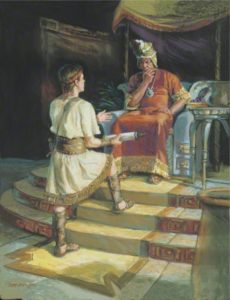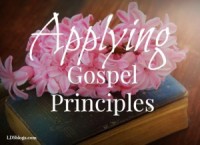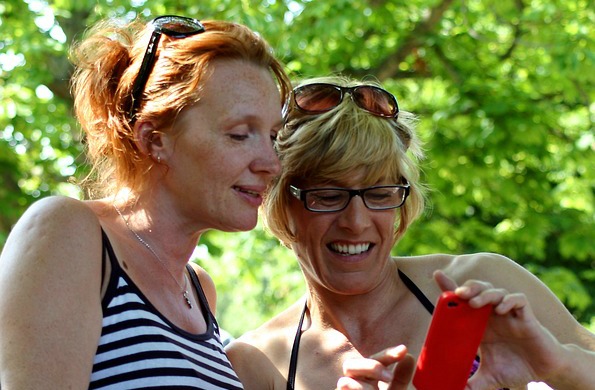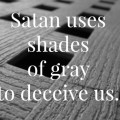This morning, as I walked down the sidewalk, I realized I would intersect with a mom and two boys getting out of the car to go to school. The mom had her back to me, grabbing things out of the car while the youngest boy talked. As I approached them, I smiled at the kids, and the younger boy looked at me, stopped talking, and covered his eyes with his hands.
I started laughing and said good morning as I passed. The mom said hi. Still laughing, I turned around and said he reinforced what I suspected, that I was scary.
 Basically, walking together at this point, the mom said that actually, her son was telling her a story of a scary movie he saw and showed her what he did when he got to a scary part—he covered his eyes.
Basically, walking together at this point, the mom said that actually, her son was telling her a story of a scary movie he saw and showed her what he did when he got to a scary part—he covered his eyes.
I laughed even more then. How funny! Had I not said anything, I would have gone the rest of my life thinking that kid covered his eyes because he saw me. That gave me lots of think-fodder for my last mile and a half.
I’ve thought and wondered a lot over the years about how perception becomes reality. Even harmless encounters, like with eye-covering boy, are tabulated and calculated with conclusion drawn. I make a snap-judgment.
Snap-Judgment Science (yes, it’s a thing!) discovered that our initial superficial judgments are quite accurate—is someone shy or extroverted? Is someone happy or stressed? Is someone chatty or reticent? Even many lifestyle habits are discernible in a snap-judgement.
I’ve definitely recognized times two times I make snap-judgments: when choosing a grocery store line and when trying to find pole position on the interstate. How engaged is the grocery store clerk? Chatty? Focused? Fast? And even though I can’t actually see a driver, it’s pretty easy to determine driving style by viewing the vehicle as an extension of the person.
An article about snap-judgment published by the Observer, a medium for the Association of Psychological Science, said that given two candidates and asked to pick the winner based on a snap-judgment, Princeton students picked the winner 70% of the time!
It noted how extremely helpful intuitive snap-judgments are and how potentially crippling they are.
“Understanding the ways our minds put together information about other people not only alerts us to how other people judge us at first sight, but also helps us avoid making bad choices when evaluating other people. We like to interact with people we can understand, with whom we have enough common ground to have a conversation. The thought of new ideas, new looks, and new people can be exciting — but they can’t be so different that we feel unsafe with them. And we don’t realize how much this drive for commonality influences our decisions.
 And so, I thought I scared the little boy instead of wondering what he was telling his mom.
And so, I thought I scared the little boy instead of wondering what he was telling his mom.
I like to compare things I learn about thought processes and value judgments to the scriptures. So, in thinking about (apparent) quick encounters, I thought of David and Nabal. David’s men protected Nabal’s shepherds and David expected some hospitality shown him for his efforts. Nabal, however, didn’t think he owed David anything and refused the requested food.
They’d sized each other up, made decisions, and David prepared to battle Nabal until Nabal’s wife Abigail interceded with food, refreshment, apology, and entreaty. Her wisdom countered David’s judgment of Nabal (which was probably correct of Nabal, but not his entire household.)
David’s snap judgment of Abigail registered so highly that after Nabal died of shock, or heart attack or something, because of Abigail’s actions, David sent for Abigail to be his wife.
Snap-judgments, combined with deeply held and often incorrect, judgments about others cause us to make all sorts of incorrect assumptions about people. We assume we know what they think, believe, and value based on our perceptions.
Locally Based Judgments
I thought of the Jews sizing up Jesus. “And Nathanael said unto him, Can there any good thing come out of Nazareth? Philip saith unto him, Come and see.” And yet THE best and most good thing did come from Nazareth.
When Jesus asked the Samaritan woman for a drink, she responded “How is it that thou, being a Jew, askest drink of me, which am a woman of Samaria? For the Jews have no dealings with the Samaritans.”
Reinforcing the woman’s statement, when the Savior’s disciples joined the conversation, they were startled to see Jesus talking to the Samaritan. “And upon this came his disciples, and marveled that He talked with the woman: yet no man said, What seekest thou? Or, why talkest thou with her?” But they thought it!
Judgment Against Race
When Ammon found King Limhi’s city, the king’s guards immediately bound him and took him captive for being by the city wall while the king was near. King Limhi felt some curiosity, which saved Ammon’s life. “I suffered that ye should be preserved, that I might inquire of you, or else I should have caused that my guards should have put you to death.”
 Years of war and fear kept Limhi on edge. Luckily, he felt something during his snap-judgment of Ammon that kept Ammon alive and ultimately liberated Limhi and his people.
Years of war and fear kept Limhi on edge. Luckily, he felt something during his snap-judgment of Ammon that kept Ammon alive and ultimately liberated Limhi and his people.
The other Ammon encountered King Lamoni. “And as Ammon entered the land of Ishmael, the Lamanites took him and bound him, as was their custom to bind all the Nephites who fell into their hands, and carry them before the king; and thus it was left to the pleasure of the king to slay them, or to retain them in captivity, or to cast them into prison, or to cast them out of his land, according to his will and pleasure.”
So, just because Ammon was a Nephite, he was bound. There’s no indication of Lamanites trying to get to know a Nephite—hey, what’s he like? Maybe he would fit in just dandy despite the color of his skin and his cultural background. Nowhere in the list of options, did it mention that the king invited a Nephite to just live in the land—slay, captivity, prison, cast out of his land seemed to be the typical options.
And yet, Ammon and Lamoni became best friends.
Lamoni’s father attempted to slay Ammon because of his race. His snap-judgment revealed his deeply held presumptions. “And he also said: Whither art thou going with this Nephite, who is one of the children of a liar?” King Lamoni’s father attempted to kill Ammon, but Ammon gained the upper hand.
After Ammon persevered against him, Lamoni’s father saw Ammon’s soul and true intent. That Nephite skin housed love and loyalty and friendship. That hated race brought him the Gospel of peace, knowledge, and offered salvation.
Judgment Against Religion
Amalakiah sought to destroy liberty—especially freedom of religion—and aimed to kill Christians. Captain Moroni petitioned God to preserve the liberty of all and the lives of the Christians. After his prayer, Moroni’s answer was that “Surely God shall not suffer that we, who are despised because we take upon us the name of Christ, shall be trodden down and destroyed, until we bring it upon us by our own transgressions.” Then he rallied the people to battle and ultimately conquered those who sought to destroy them because of their faith.
The other Moroni faced similar religiously-prejudicial malevolent intent. “I make not myself known to the Lamanites lest they should destroy me…and because of their hatred they put to death every Nephite that will not deny the Christ. And I, Moroni, will not deny the Christ; wherefore, I wander whithersoever I can for the safety of mine own life.”
And so many more stories flood my mind—like Peter and Cornelius, like Saul and the Christians, like Cain and Abel.
Each of these scenarios shows negative impacts of allowing preconceived judgments to dictate the way I interact with others. When I saw the eye-covering boy, something deep in my soul assumed something. I didn’t know what that little boy was thinking or saying or feeling, I just thought I did.
But, I always have the opportunity to find out what someone is thinking or feeling–by just asking him or her! Had I not learned the true reality of that interaction, I would have filed it away to affect some future snap-judgment. When I assume anything about others, I run the same risk.

To read more of Delisa’s articles, click here.
Jesus Christ warned against pride and hearts that are past feeling. He urges over and over and over and over, “Love thy neighbor as thyself.” Why!? Because we are ALL—all of us, each of us, every past, present, and future person on this planet—children of God. We are family. We are blood. We are capable of understanding each other and loving each other.
“He invited them all to come unto Him and partake of His goodness; and He denieth none that come unto Him, black and white, bond and free, male and female…and all are alike unto God.”
About Delisa Hargrove
I am a member of The Church of Jesus Christ of Latter-day Saints. I have moved 64 times and have not tired of experiencing this beautiful earth! I love the people, languages, histories/anthropologies, & especially religious cultures of the world. My life long passion is the study & searching out of religious symbolism, specifically related to ancient & modern temples. My husband Anthony and I love our bulldog Stig, adventures, traveling, movies, motorcycling, and time with friends and family.





